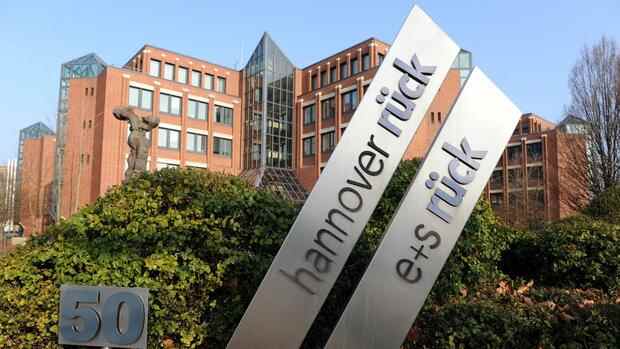Munich Hannover Re managed to get into the Dax at the second attempt. After the reinsurer narrowly failed to increase the leading German index to 40 companies in the fall, the share is now replacing Siemens Energy.
In addition, Daimler Truck is stepping up for Beiersdorf. The change will be completed on March 21, as announced by Deutsche Börse on Thursday evening. Hannover Re was already a member of the Dax for a short time during the turbulent phase of the financial crisis.
The share of the third largest reinsurer in the world behind Munich Re and Swiss Re could give a further boost to the rise in the German top 40. In the past few weeks, the interest of well-known analysis houses in the value had already increased significantly. Ashik Musaddi from the US bank Morgan Stanley included the stock in his rating with a price target of 200 euros.
After soaring until mid-February, during which the price rose to over 180 euros, the share has recently fallen significantly – like the entire market in the context of the war in Ukraine. The price is currently around 145 euros. Morgan Stanley’s price target would correspond to an upside potential of more than 27 percent.
Top jobs of the day
Find the best jobs now and
be notified by email.
Business hardly affected by the war in Ukraine
According to analysts, Hannover Re is only indirectly affected by the events in the Ukraine. According to its 2020 annual report, the parent company Talanx, which owns just over half the shares, holds Russian bonds totaling 524 million euros.
“Ukrainian stocks, on the other hand, don’t seem to play any role at all,” writes Werner Schirmer from Landesbank Baden-Württemberg (LBBW) in a recent study. More up-to-date figures should not be available until March 14, when Talanx presents the balance sheet for the past year.
What is more decisive for Hannover Re, however, is that business is going well despite the currently very confusing mixture of war, pandemic, inflation, natural disasters and cybercrime. Although the group will not officially be presenting its audited annual financial statements until next Thursday (March 10), the preliminary figures from early February already made it clear that the demand for insurance cover has increased significantly.
Last year, gross premiums rose by almost 13 percent to a new record of EUR 27.8 billion. For comparison: at the industry giant Munich Re, premium income grew by 8.5 percent to 59.6 billion euros last year, at Swiss Re the increase was five percent to 42.7 billion dollars.
For Iain Pierce from the major Swiss bank Credit Suisse, one thing is certain: “Last year Hannover Re’s shares clearly outperformed the overall market and also the competitor stocks.”
Surprising price increase in treaty renewals
The significantly increased premium income was also noticeable on the profit side for the Hanoverians. At 1.23 billion euros, net profit was almost at the upper end of the target range of 1.15 to 1.25 billion euros, which was only raised in the autumn.
>>Read also: Despite natural catastrophes and the corona crisis – Hannover Re achieves a profit in the billions
Thorsten Wenzel, analyst at DZ Bank, was not surprised by the profit achieved, but by the price level that the reinsurer was able to negotiate with its customers in the contract renewal round in January. The group announced an inflation- and risk-adjusted price increase of over four percent and a premium increase of over eight percent.
DZ Bank analyst Wenzel therefore praises the fact that the price level negotiated in January rose a little more than he had thought. He then raised his price target for Hannover Re shares to EUR 200 from EUR 185 previously.
For the current year, the Hannover Re management around CEO Jean-Jacques Henchoz is now assuming a profit range of 1.4 to 1.5 billion euros. The premium income should increase by at least five percent, provided that the exchange rates remain constant. The result would be gross premiums of over 29 billion euros.
The areas of natural catastrophes and cybercrime are likely to be key drivers. Already in the past year, both price increases and significantly more contracts were recorded. This trend is likely to continue in the current year.
On the one hand, the demand for comprehensive property protection after the severe damage events caused by storm Bernd and Hurricane Ida is high worldwide. Most recently, the three consecutive winter storms Ylenia, Zeynep and Antonia in February drove demand.
High demand for cyber insurance
A total of 970,000 insured claims cost insurers 1.4 billion euros. Such natural phenomena are becoming increasingly unpredictable. “Three severe hurricane-like storms in such a short time have so far been rather rare in Germany,” says Jörg Asmussen, general manager of the industry association GDV. With increasing customer demand, the business of primary insurers usually grows, and they in turn outsource some of the risks to reinsurers.
Cyber insurance is currently experiencing a similarly high level of demand. Many companies – especially in the areas of so-called critical infrastructure – are currently increasing their protective measures. The main reason is the outbreak of war in Ukraine.
Reinsurers make most of their money in North America. There, Hannover Re already experienced price increases in the high double-digit range last year. The trigger was the number of cyber attacks, which has been increasing for years. Accenture consultants have recently determined an increase in large corporations of 31 percent since 2020. Respondents estimated the associated cost to their business at $1.3 million over 12 months.
This trend is likely to increase further, as many experts expect that the number and quality of cyber attacks will also increase with the clashes in Ukraine. At Hannover Re, however, the usual reticence is shown on this topic. It is only said that further business opportunities are expected with the upcoming business renewals this year.
More: High inflation is becoming a problem for property-casualty insurers and their customers.
